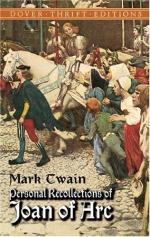If the English had captured Joan then, Charles VII. would have flown the country, the Treaty of Troyes would have held good, and France, already English property, would have become, without further dispute, an English province, to so remain until Judgment Day. A nationality and a kingdom were at stake there, and no more time to decide it in than it takes to hard-boil an egg. It was the most momentous ten minutes that the clock has ever ticked in France, or ever will. Whenever you read in histories about hours or days or weeks in which the fate of one or another nation hung in the balance, do not you fail to remember, nor your French hearts to beat the quicker for the remembrance, the ten minutes that France, called otherwise Joan of Arc, lay bleeding in the fosse that day, with two nations struggling over her for her possession.
And you will not forget the Dwarf. For he stood over her, and did the work of any six of the others. He swung his ax with both hands; whenever it came down, he said those two words, “For France!” and a splintered helmet flew like eggshells, and the skull that carried it had learned its manners and would offend the French no more. He piled a bulwark of iron-clad dead in front of him and fought from behind it; and at last when the victory was ours we closed about him, shielding him, and he ran up a ladder with Joan as easily as another man would carry a child, and bore her out of the battle, a great crowd following and anxious, for she was drenched with blood to her feet, half of it her own and the other half English, for bodies had fallen across her as she lay and had poured their red life-streams over her. One couldn’t see the white armor now, with that awful dressing over it.
The iron bolt was still in the wound—some say it projected out behind the shoulder. It may be—I did not wish to see, and did not try to. It was pulled out, and the pain made Joan cry again, poor thing. Some say she pulled it out herself because others refused, saying they could not bear to hurt her. As to this I do not know; I only know it was pulled out, and that the wound was treated with oil and properly dressed.
Joan lay on the grass, weak and suffering, hour after hour, but still insisting that the fight go on. Which it did, but not to much purpose, for it was only under her eye that men were heroes and not afraid. They were like the Paladin; I think he was afraid of his shadow—I mean in the afternoon, when it was very big and long; but when he was under Joan’s eye and the inspiration of her great spirit, what was he afraid of? Nothing in this world—and that is just the truth.
Toward night Dunois gave it up. Joan heard the bugles.
“What!” she cried. “Sounding the retreat!”
Her wound was forgotten in a moment. She countermanded the order, and sent another, to the officer in command of a battery, to stand ready to fire five shots in quick succession. This was a signal to the force on the Orleans side of the river under La Hire, who was not, as some of the histories say, with us. It was to be given whenever Joan should feel sure the boulevard was about to fall into her hands—then that force must make a counter-attack on the Tourelles by way of the bridge.




